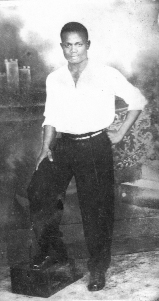In an interview with Stabroek News Tyrel said over the 45 years that he was employed at the Board he worked in several departments and succeeded. He said he was particularly proud of his task examining boats and wharves, one of the more menial tasks.
Tyrel said that his first job after leaving school was manning the pumps at a gas station where he learnt from an early age that the consumer is always right. Later he found employment at the GRB which was then managed by Peter Bailey.

Tyrel recalled the challenges six men faced loading 450 bags of rice every day. Another two were tasked with loading 150 bags to bring the total for that shift to 600 bags. The bags were moved from one location by tractors, boats and the railway system. Workers who met the requirements for the 7am to 4pm shift returned at 6pm and worked for an additional agreed number of hours for much needed overtime pay.
Before long however, management discovered that the payment for the hours worked proved too costly on its budget. At the same time, the hours of work was proving too burdensome for the workers. Out of this crisis, a decision was made to introduce a daily work schedule which proved ideal to all concerned.
Tyrel also recalled sadly the tragic passing of one of the Board’s most dedicated workers, Cecil Bain. Bain had earned the nickname ‘Speedy’ for his efforts and ability to get the job done. He met his demise when while carrying one of the bags he tripped and fell into one of the rice bins and was soon buried in rice. Even though the bin was made of wood, it took the fire brigade some time to reach the scene and then to cut into the walls of the bin to free him. By that time, Bain was dead. Tyrel said many sad incidents occurred over his years at the GRB but Bain’s death is the most tragic.
He remembered a fire that started with just a few sparks that quickly engulfed the place, which coincided with former Governor Young’s visit to Guyana. That incident was cemented in the minds of many as the worst act of sabotage that the Board had ever experienced. It seemed as though it took firemen under the late Fire Chief Henry McDowell several hours to bring the blaze under control.
Bandits were also a constant threat to the Board. They would sail in under the wharves in hangars, cut through them, steal the rice and make good their escape. To counter this threat, management invested in steel punts and used asphalt to secure the wharves. Several weeks after the fire, the Fire Chief found that the bitumen that was used to secure the wharves was why the fire had been undetected for some time before turning into an inferno.





